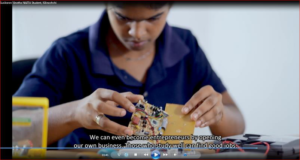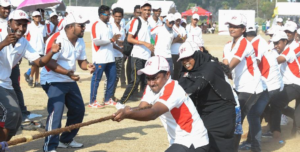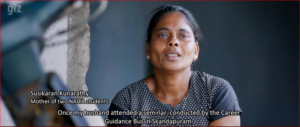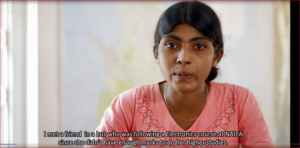GIZ Gender Competition 2018
GIZ Sri Lanka: Vocational Training in North & East of Sri Lanka (GIZ-VTN)
Introduction
In collaboration with the Government of Sri Lanka and the Federal Republic of Germany, the Deutsche Gesellschaft für Internationale Zusammenarbeit (GIZ) GmbH, in cooperation with the Ministry of Skills Development and vocational Training established the Sri Lankan German Training Institute (SLGTI) in Kilinochchi and opened in July 2016, to meet the skill needs of the local, national and international labour market. Another project activity provides short-term training for disadvantage women group, it means the group has less possibilities to use one of the formal training programs. This non-formal training objective is to improving the income generation activities in rural women.
The VTN projects main aim is to provide high quality training for youth from NVQ 4 upwards in trades that would have a high skills demand and career opportunities. The project will attempt to address the vocational and technical skills needs of youth, both women and men in the region and eventually the country. The project will mainstream gender requirements in all its programs, procedures and interventions. (If you need more information please visit: www.vtnaita.com )

Promoting gender equality
Young women have difficulties to obtain qualifications of relevance to the labour market especially in the post war setting of the northern region. Women’s labour force participation in the North and East of the country prior to the conflict was low by national standards. Cultural norms keep Tamil women engaged in household work and income generation within the home. Women contributed to the household economy by working in family farms. Although women in the North are 64% of the working age population, women’s labour force participation rate is only 16%, significantly lower than the male’s rate, 55%. (Source: http://www.fao.org/docrep/009/ag114e/AG114E03.htm)
Therefore, the task of recruiting and retaining women in Vocational Training activities remains a challenge to the project. The problems hindering the access for women and girls to vocational training:
The traditional cultural structure confines women to particular roles. The prevailing social norms influence the participation of women and girls’ in economic activities differently according to their age, marital status and educational qualifications as well as to the sector in which training is provided.
The distance to the training centres are a deterrent for women and girls in rural areas to access VT programs.
There are hardly qualified female trainers employed in the north.
The poorly social acceptance of woman in so called “men dominated trades”.
The training packages are less adapted to women’s needs.
There is a missing interest for women to be trained, due to a lack of awareness about vocational training.
From the mentioned challenges the following objectives arise for the vocational training sector and the VTN Project:
1. To support and encourage young females to be confident and to gain employment.
2. To raise awareness and information in communities about the possibilities and opportunities of vocational training for women and men.
3. To support vocational training centres and institutions to include gender issues and empowerment for woman.
VTN project needs to state one of the success stories in the project:
Promote the awareness within the communities (especially family members) to accept the women who are studying the vocational training and to be given the opportunities to work with men in the work places. These are the activities leads to encourage more women participation in the VT centers.
In Kilinochchi NAITA Centre, first time there were 4 young girls studied electronic and electrical technology sector. This story is one of these young girl life changes in the society.
The story begins in 2014, VTN project conducted the career guidance promotions in Skanthapuram, Kilinochchi. Most of the young girls and boys participated at the same time their parents also participated this village promotional activity, Ms Susikaran Vinotha and her father also came to see our promotional activities.
During the awareness program she took application form to apply the vocational course. She asked her parent to apply for the electronical course because her wishes to become an electronics engineer in future but during the war she stop her studies and she didn’t continue the school studies. She thought she can continue her studies to achieve her wishes with vocational training and she asked her parents to join in the vocational training centre.
(Statement taken from: publications related to Monitoring and Evaluation from GIZ HQ) https://intranet.giz.de/cps/rde/xchg/giz_intranet_en/XSL/hs.xsl/-/HTML/162562.htm?null
Vinotha’s mother sated us in the interview her husband explained to her and he willing to send their daughter to learn vocational course. Vinotha explained to her parents about her dream to study an electronic course. And she started to study electronic course in NAITA centre, Kilinochchi in 2014.
She is the first women studied in electronic vocational course in their village, during the training period she traveled by bus, one day she met her school friend in the bus and Vinotha shared her experience in vocational training electronic course with her friend. The friend also willing to join the course with her. Vinotha helps her friend to join with the vocational course.
Not only this situation but also, she given impression to the young girls to learn electrical and electronic courses in vocational training centres, after the year her sister and her village young girls engaged with electronic and electrical non-traditional courses in the vocational centres. Vinotha followed On-the-Job training in Sri Lanka Telecom, Kilinochchi. She stated; “girls can do many thing and I like to stay my village to develop my village to start an own business become an entrepreneur”.

Gender as a quality feature of our work
Within the project, staff recruitment is considering gender balanced. It leads to help staff to collaborate and resolve the small problems with partner officials as well as students in the Centre’s. GIZ initiated and encouraged the partners conducted the cultural events and exposure visit for all students. Not only events, but also encourage partners to participated Training of Trainers (ToT) training program on gender sensitivity and encourage them to conduct gender awareness workshops with students. Instructors got well understanding and they balanced gender equality during the training of trainers’ workshop.
Gender and RBM
The RBM applied in the project in order to measure gender outcome of the project. The project has and indicators which defines In altogether 48 newly developed and/or revised basic and further training courses, the promoted vocational training establishments train an annually increasing number of youth from the project region, of whom 30% are women.
At present progress monitoring gender segregated data shows project has achieved 47.66% of female students followed VT courses and completed their On-the-Job training in 16 vocational training centres which are VTN project support.
Another indicator says, to support disadvantaged groups to improve their livelihood and living standard through in-formal trainings by 80% of them are women. so far VTN project achieved this indicator.

Cooperation.
The project mainly focuses on the Gender mainstreaming and Economic empowerment of the women through the project in line with the BMZ action plan that defines. The project has the steering committees for take strategic decision of the project that influence to achieve the gender goal together with stakeholders. In the operational level we have a VT provider’s forum led by the District Secretariat that will support to achieve the gender objectives as a team.
Conclusion.
The project facing challenges to initiate the young Tamil girls to learn vocational training courses especially automobile, electrical and electronical sector.
The VTN project is in its inception stage and the needs for gender mainstreaming has been recognized and prioritized.
Since the VTN project works closely with several state and non-state agencies the gender mainstreaming system will address these institutions too.
It is hoped that eventually the SLGTI and its core partners will internalize the gender mainstreaming strategy of the VTN project.



